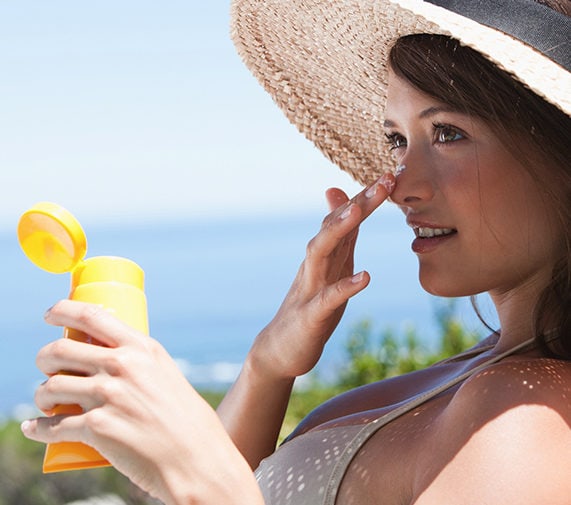Move over, rejuvenation, and make way for “prejuvenation,” a term coined by a Harvard-affiliated dermatology professor Dr. Kenneth Arndt. Prejuventaion refers to preventing sun damage, a much easier and less expensive undertaking than going on a major rehabilitation spree to correct the ravages of time years later.
Though sun protection is something to think about every season, in summer, we’re baring our skin to the elements and spending more time outdoors. There are some ways you can protect yourself from the inside—namely, by eating red foods such as canned tomatoes and tomato paste, which are high in Lycopene, and consuming antioxidant-rich foods such as dark leafy greens, blueberries, and cabbage. Lycopene and antioxidants help protect the skin from UV rays and free radicals.
But you can also protect yourself from the skin on in. Summer can make your skin oilier, and you’ll want to swap out thicker winter creams and serums for lighter ones and use oil-free cleansers and makeup removers. It’s also time to upgrade your sun protection: We like Alastin’s HydraTint Pro Mineral Broad Spectrum Sunscreen SPF 36 for a little coverage help if you’re skipping foundation, as well ZO Skin Health’s Triple Spectrum Protection products.
And because you’ve probably not lived under a rock your whole life, you already know about sunscreen and a wide-brimmed hat for maximum protection against harmful UV rays. But are you sure about everything else? Take this quick quiz to find out.
1. I’m safe from UV rays in the shade of an umbrella, a cloud or tree without sunscreen. TRUE or FALSE
2. My dry T-shirt offers more protection than my wet one. TRUE or FALSE
3. Most sunglasses will protect my eyes from UV rays and reduce the risk of cataracts. TRUE OR FALSE
4. You should reapply sunscreen every:
A. 30 minutes
B. 2 hours
C. 8 hours
5. Sun damage manifests as:
A. Wrinkles, fine lines and dark spots
B. Broken blood vessels
C. All of the above
6. The sun is at its most intense:
A. At 3 p.m.
B. At 9 a.m.
C. At 1 p.m.
7. It’s best to wear makeup or moisturizer with SPF rather than apply SPF separately. TRUE or FALSE
8. If I layer two kinds of SPF 15 sunscreen, I’ll get SPF 30 protection. TRUE or FALSE
9. Water-resistant sunscreen protection lasts:
1. 40 minutes
2. 80 minutes
3. 120 minutes
10. Ibuprofen can affect my sun sensitivity. TRUE or FALSE
How did you score?
8-10 correct: You’re a super SPF star! Go out and have fun in the sun!
0-8 correct: Study up, buttercup! Be sure to read every label and understand not only what sun protection is right for you, but also how it works.
For a comprehensive primer on skin prep this summer, visit the website and Harvard Medical School’s online magazine.
Answers:
1. FALSE. Though shade does help, you’ll still need protection with sunscreen or UV-proof clothing. A lot of light comes from reflections off the water and other surfaces, which can affect your skin.
2. TRUE. Dry clothing blocks out more sun than wet clothes; darker colors offer more protection than light.
3. TRUE. Most sunglasses sold in the United States offer at least some UV protection—look for ones that have UVA and UVB rays. Wrap-around styles offer the most coverage.
4. B. Apply sunscreen liberally every couple of hours—and more often if you’ve been swimming or sweating profusely. Don’t forget the back bits and behind your neck and ears.
5. C. Though some conditions are hereditary and due to other environmental factors, such as smoking, sun damage is avoidable and shows up over time as wrinkles, fine lines, dark spots and broken blood vessels.
6. C. The sun is at its strongest from 10 a.m. until 2 p.m. Try to get out of the sun during those hours—even if you are slathered up in sunscreen.
7. FALSE. Both are good choices, but you want to make sure you’re applying them evenly and not forgetting about the ears, neck, shoulders and other areas exposed to the sun.
8. FALSE. You’ll still have a protection factor of 15. The American Academy of Dermatology suggests using at least an SPF of 30 daily.
9. A or B. Check the label; most waterproof sunscreens only last 40 or 80 minutes, depending on the formula. Reapply after swimming.
10. TRUE. Many medications can diminish the effectiveness of sun protection. They include ibuprofen (such as Advil), naproxen (Aleve), drugs for heart conditions (Captopril), antibiotics (Cipro or Bactrim), antihistamines (Benadryl), depression meds (Elavil) and diuretics (Lasix).
twistup
Love OrangeTwist? Join our twistup membership and receive a $100 gift card today!



